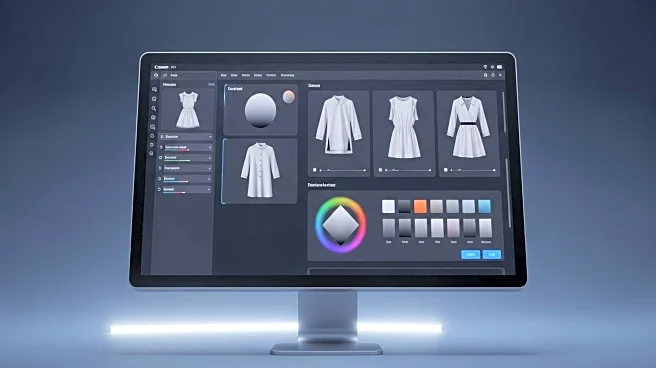What's Happening?
The fashion industry is increasingly integrating artificial intelligence (AI) to transform how products are created, marketed, and sold. A recent compilation by The Business of Fashion highlights 18 AI-powered startups that are making significant strides in the industry. These startups are developing technologies that range from generating imagery to enhancing product listings and personalizing recommendations. Notable companies include Bing, Spangle, and Daydream, each offering unique solutions to improve efficiency and responsiveness to fashion trends. Collectively, these startups have raised over $400 million in the past five years, driven by investor interest in AI's potential to reduce costs and accelerate trend adaptation.
Why It's Important?
The integration of AI in fashion represents a pivotal shift that could redefine industry standards. By leveraging AI, fashion companies can streamline operations, reduce costs, and enhance customer experiences through personalized offerings. This technological advancement is crucial for maintaining competitiveness in a rapidly evolving market. Startups like Spangle and Altana are already partnering with major brands such as Revolve and L.L. Bean, showcasing the growing influence of AI solutions. As these startups continue to innovate, they may challenge established tech giants, potentially leading to a reshaping of market dynamics and consumer expectations.
What's Next?
The future of AI in fashion will likely involve increased competition among startups and established tech firms. As these companies refine their technologies, they must differentiate themselves to capture consumer interest and avoid direct competition. The ongoing development of AI solutions will require startups to build robust business models to withstand potential market fluctuations. Investors are keenly observing which approaches will emerge as dominant, with the anticipation that a few key players will lead the industry transformation.
Beyond the Headlines
The rise of AI in fashion also raises ethical considerations, such as data privacy and the impact on employment within the industry. As AI automates various processes, there may be shifts in job roles and requirements, necessitating new skills and training for workers. Additionally, the reliance on AI for trend prediction and personalization could influence cultural perceptions of fashion, potentially leading to homogenization or loss of traditional craftsmanship.








